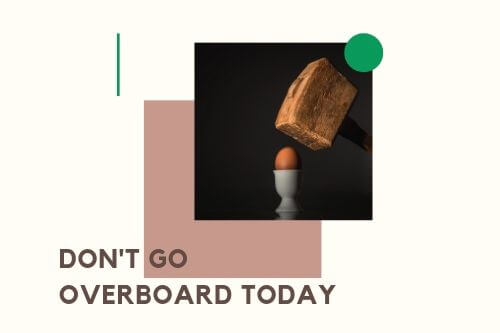
YouTube / iTunes / Spotify / Radio Public / Pocket Casts / Google Podcasts / Breaker / Overcast
Listen to ArtisanEnglish.jp posts & lesson intros here.
Word of the Day: Go overboard
It would have been easy to use a picture of a person falling off a boat to illustrate go overboard today, but that may have been a little misleading.
The meaning of go overboard, as I’m introducing it today, has nothing to do with boats, ships, rafts, or other watercraft.
Neither does it relate to falling off of them into the water.
Go overboard, as introduced today, means to do too much, to become overly excited about something, or to be so eager about something that your eagerness creates a negative outcome.
Now, can you see the relevance of today’s picture?
Anyone who attempts to use a large wooden mallet to crack an egg is surely going overboard.
It will get the job done, but will there be anything left to eat once the operation ends?
Probably not.
There you go.
See, that’s the negative effect right there.
It seems it might be part of human nature to go overboard with things.
Look at how we eat these days.
In North America, it’s not unheard of for someone who enjoys ice cream to sit down with a full container and a spoon and eat the whole container.
Everyone likes ice cream, but eating two litres in one sitting is going overboard.
Heck, even eating ice cream every day may seem like pushing the limits of what is reasonable to some people.
Then we have video games.
Games are cool, a great way to unwind after a stressful day and just plain fun to play.
A few hours of gaming once in a while never hurt anyone.
Playing for days on end, though, barely allowing yourself time to eat or go to the bathroom is, in my books, going overboard.
It’s hard to curb the human instinct to go overboard with things we enjoy.
Flesch-Kincaid Readability Test
This post is understandable by someone with at least a 7th-grade education (age 12).
On the Flesch-Kincaid reading-ease test, this post scores 73.
The easier a passage is to read, the higher the score on a scale of 0 – 100.

